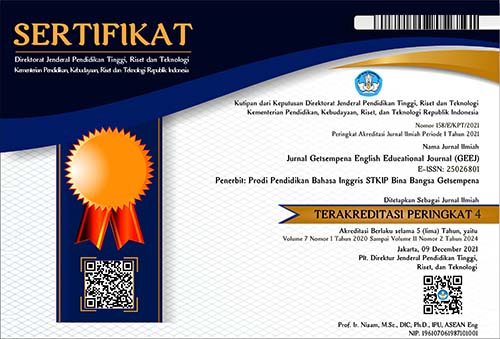THE EFFECT OF PROBLEM-BASED LEARNING MODEL ON THE SOCIOLINGUISTICS LEARNING OUTCOMES OF PRIVATE UNIVERSITY STUDENTS IN ACEH
Abstract
This study aims to analyze the effect of the application of the problem based learning model in sociolinguistic learning on student learning outcomes of English Education at private universities in Aceh. This study used an experimental method with a research form that is pre-experimental design and one-group pretest-postest design experimental design. The population in this study were 40 students from private universities in Aceh. The sample in this study was the entire population of 40 students who were divided into two experimental groups, where Experiment Group A 20 people and Experiment Group B 20 people. The research instrument used was the learning outcome in the form of a multiple choice test of 20 questions. The data collection technique in this study is a measurement technique. Hypothesis test results using t-stat which is obtained in Experiment group A tstat (-18.6) < t Critical two-tail (2.093) with an average value of pre-test 59.75 and posttest 78 and Experiment group B tstat (-27 , 5) < t Critical two-tail (2,093) with an average score of 58 pre-test and 78 post-test. From the results of these calculations it can be concluded that there is an effect of using problem based learning models on learning outcomes in sociolinguistic learning of private university students in Aceh.
References
Ary, D., Jacobs, L. C., Sorensen, C., & Razavieh, A. (2010). Introduction to Research in Education (8th Ed.). California: Wardworth.
Hartas, D. (2010). Educational Research and Inquiry. London: Continuum International Publishing Group.
Jailani., Sugiman., & Apino, E. (2017). Implementing the Problem-Based Learning in Order to Improve the Students’ HOTS and Characters. Jurnal Riset Pendidikan Matematika. 4(2). 247-259. https://doi.org/10.21831/jrpm.v4i2.17674
Johnson, R. B., & Christensen, L. (2014). Educational Research: Quantitative, Qualitative and Mixed Approaches. Thousand Oaks: SAGE.
Khoiriyah, A. J., & Husamah. (2018). Problem-Based Learning: Creative Thinking Skills, Problem-Solving Skills, and Learning Outcome of Seventh Grade Students. Jurnal Pendidikan Biologi Indonesia. 4¬(2). 151-160. https://doi.org/10.22219/jpbi.v4i2.5804
Maxwell, B. R. (2020). Problem-Based Learning (PBL) in a Grade 11 World History Class: Trials, Tribulations, and Triumphs. Journal of Problem-Based Learning. 7(1). 11-20. https://doi.org/10.24313/jpbl.2020.00248
Miarso, Y. (2004). Menyemai Benih Teknologi Pendidikan. Jakarta: Prenada Media.
Narmaditya, B. S., Winarning., & Wulandari, D. (2017). Impact of Problem-Based Learning on Student Achievement in Economic Course. Classroom Action Research Journal. 1(1). 1-11. https://10.17977/um013v1i12017p001
Ratnaningsih, S., Nahartini, D., & Yuliayani, A. (2018). The Effect of Problem-Based Learning Methods and Self Confidence to English Learning Outcomes in The Elementary School. Tarbiya: Journal of Education in Muslim Society. 5(2). 135-144. https://doi.org/10.15408/tjems.v5i2.10640
Riyanto, A. (2003). Proses Belajar Mengajar Efektif di Perguruan Tinggi. Bandung: Yapemdo.
Rubiah, M. (2016) Implemetation of Problem-Based Learning Model in Concept Learning Mushroom as a Result of Student Learning Improvement Efforts Guidelines for Teachers. Journal of Education and Practice. 7(22). 26-30. https://files.eric.ed.gov/fulltext/EJ1112940.pdf
Rusman. (2010). Model Model Pembelajaran. Bandung: Rajawali Pers.
Savin-Baden, M. (2020). What are Problem-Based Pedagogies?. Journal of Problem-Based Learning. 7(1). 3-10. https://doi.org/10.24313/jpbl.2020.00199
Setia, R. F. (2014). Penerapan Pembelajaran Berbasis Masalah Dalam Membaca Ekstensif Teks Nonsastra Pada Siswa Kelas X SMA. Bahtera Bahasa: Antologi Pendidikan Bahasa dan Sastra Indonesia. Pembelajaran Kebahasaan: No. 12. https://ejournal.upi.edu/index.php/PSPBSI/article/view/478
Shofiyah, N., & Wulandari, F. E. (2018). Model Problem-Based Learning (PBL) Dalam Melatih Scientific Reasoning Siswa. Jurnal Penelitian Pendidikan IPA. 3(1). 33-38. http://dx.doi.org/10.26740/jppipa.v3n1.p33-38
Sinambela, N.J.M.P. 2006. Keefektifan Model Pembelajaran Berdasarkan Masalah (Problem-Based Instruction) Dalam Pembelajaran Matematika untuk Pokok Bahasan Sistem Linear dan Kuadrat di Kelas X SMA Negeri 2 Rantau Selatan Sumatera Utara. Surabaya : Program Pasca Sarjana Universitas Negeri Surabaya.
Slavin, R. E. (2009). Educational Psychology: Theory and Practice. Terjamahan oleh Marianto Samosir. Jakarta: PT Indeks.
Sugiyono. (2007). Metodologi Penelitian. Bandung: Alfabeta.
Sugiyono. (2014). Statistik untuk Penelitian. Bandung: Alfabeta
Trianto. (2010). Mendesain Model Pembelajaran Inovatif-Progresif. Jakarta: Kencana Prenada Media Grup.
Wena, M. (2009). Startegi Pembelajaran Inovatif: Suatu Tinjauan Konseptual Operasional. Jakarta: Bumi Aksara.
Wina, S. (2007). Strategi Pembelajaran Berorientasi Standar Proses Pendidikan. Jakarta: Kencana Prenada Media Group.
Yuliana., & Firmansah, F. (2018). The Effectiveness of Problem-Based Learning with Social Media Assistance to Improve Students’ Understanding Toward Statistics. Infinity: Journal of Mathematics Education. 7(2). 97-108. https://doi.org/10.22460/infinity.v7i2.p97-108
























